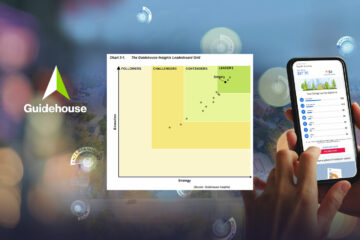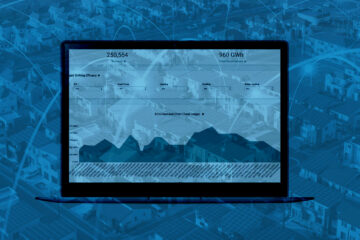Watch the full Engage+ episode on demand.
Against the backdrop of Houston’s extreme weather and vulnerable communities, CenterPoint Energy has prioritized strong resiliency and electrification strategies to maintain its status as the energy capital of the world. The key to both, they have determined, is a multi-stakeholder approach.
In the second episode of Bidgely’s 2022 Engage+ video series, we traveled to Texas to sit down with CenterPoint Energy’s Vice President of Energy Solutions and Business Services Elizabeth Gonzalez Brock to learn more about how the utility’s Reliance Now and EVolve Houston programs have engaged industry and community leaders in developing collaborative solutions to Houston’s greatest energy challenges and inform their grid planning with diverse perspectives.
“In the Houston region, we’ve had seven national declared disasters during our current mayor’s six-year administration. We also have a lot of data that tells us that storms are coming with more frequency and more intensity,” said Brock. “An important part of what we do with that information is considering the question of equity versus equality. When we built our system, we built it for equality. We wanted to make sure that all of our customers were treated equally. But equity tells a different story. Not all customers have the same needs. Critical infrastructure like hospitals or grocery stores, and vulnerable low income, elderly and disabled customers and regions that experience the brunt of extreme weather most often experience a greater impact. So just having a good understanding of what our customers’ needs are is really important.”
Brock shared that CenterPoint believes when you’re solving big problems, you don’t solve them on your own. It’s that point of view that guides their approach to building the grid of the future.
“It’s not one company, not one utility, that can solve the problem of resiliency,” she said. “We need to bring our community together and get inputs from various sectors so we know how to best serve them. That’s why we developed a customer advisory panel to help us understand what the critical needs are. And we have used those inputs to inform our business decisions and make sure that we’re thinking about the future the right way.”
When it comes to advice for other energy providers worldwide, Brock said there were several key lessons learned from CenterPoint’s approach.
“First, communication is key. People want to know what happened. People want to know what you’re going to do to fix their problems. They want to know what’s going to be different next time,” she advised. “You also need community advocates. We’re working on building a more resilient city. But in order to do that, we need people to advocate for essential changes and new infrastructure. Finally, you need to be able to agree on how we’re going to optimize our funding. So whether it’s through seeking federal dollars, or whether it’s advocating at the PUC, or at the legislature, or even making our own customer investment. Energy providers need a strategy around how to pay for all these things that we want to do.”
CenterPoint is demonstrating the benefit of this approach through its Resilient Now initiative – working with the City of Houston to create a master energy plan for the city that will preserve its reputation as the energy capital of the world.
“Resilient Now began with a conversation with our largest customer — the city of Houston — about how we can better serve their needs and align our business objectives and goals around their aspirations,” said Brock. “Together we explored what we need to do to ensure a more sustainable future. But also, how do we look at resilience? The “now” piece is crucial. We’re prioritizing shovel-ready projects that can instill confidence from our customers and our region. And we have put together a framework that enables us to communicate together with a united voice when we speak to our customers and the city’s constituents. We’ve gotten a lot of positive feedback about Resilient Now with other stakeholders and communities outside Houston wanting to join and give inputs. It’s another of those huge problems that we’re not going to solve by ourselves, so we need as much input as possible so that we can plan for the future.”
CenterPoint has tackled transportation electrification in the same way.
“We need to understand what our investment requirements are going to be if electric transportation takes off,” emphasized Brock. “You’ve got to think about all the things that can be electrified. Everything from ports, equipment, forklifts, cars, buses, rail — all of that electrification is included are in our C&I, customers’ 2030 goals. Part of the Resilient Now planning process is understanding what our infrastructure requirements will be. But at the same time, we’ve started a nonprofit called EVolve Houston. EVolve Houston is a 501c3 with a mission to improve air quality by enabling electric transportation. Getting our 501c3 for air quality was a huge accomplishment because it hadn’t been done before. We decided to go the 501c3 route, because it was important for fundraising — to be able to get charitable dollars and make it possible for businesses to invest. It is an extra bonus for our commercial partners to be able to use monies from either their foundation or corporate contributions. I absolutely recommend this approach to other utilities because it is a way to support a good cause that aligns very well with your business goals.”
EVolve Houston’s founding members include University of Houston, the City of Houston, NRG, Shell and CenterPoint Energy. A wide range of other transportation electrification stakeholders have also come on board, including BP, Buc-ees travel centers, Uber, the Texas Auto Association, and Houston Metro and the roster continues to grow.
CenterPoint’s stakeholder engagement strategy is serving them well in pursuit of both resiliency and sustainability.
“For example, we’re really excited that the Texas legislature authorized us to develop a load management program,” she said. “If we find ourselves in a situation where we need load, large industrial customers can volunteer to go offline so that we can have that additional capacity to serve residential customers. We have tested the program as part of an initial phase one and we are focused on strategies to sign up a lot of C&I customers, because it’s a volunteer program.”
CenterPoint’s inclusive approach to resiliency, sustainability and grid planning offer valuable lessons for utilities worldwide that are developing their own future-ready strategies. In Houston, inviting diverse stakeholders to co-create and implement unified energy solutions is delivering results that will help Houston reinforce its position as the energy capital of the world.
If you’d like to hear more about the CenterPoint resiliency approach, watch the full Engage+ episode on demand and sign up now to receive updates about future episodes, including episode 3 in July when we will speak with Avangrid’s Customer Programs & Products Manager Charles Spence about Avangrid’s approach to designing an intelligent, analytics-driven EV strategy to achieve long-term transportation electrification success.


